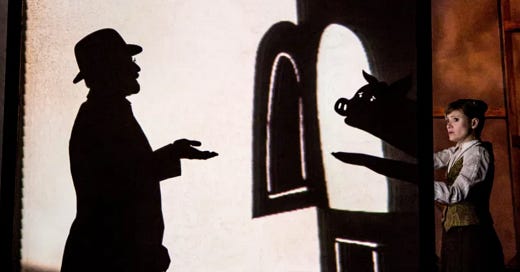MR. AND MRS. PENNYWORTH is a Visual Treat at Lookingglass
Samuel Taylor and Lindsey Noel Whiting. Photo by Liz Lauren.
There is a visual treat of fairytale proportions playing at the Lookingglass stage this month brought to you by the titular characters of MR. AND MRS. PENNYWORTH. An aesthetic so well executed and true to its genre, that you could swear book pages were flipping over and coming to life in front of your eyes. But beautiful illustrations don’t make a story particularly engaging if the content lacks emotional strength or consistency in its message. Especially if the story at hand is suppose to be that of the storytellers themselves. And dear Mr. and Mrs. Pennyworth get lost in their own tale among all the other tales they must impart, leaving one wondering was there a happily ever after, after all, and if so, for who?
This is the inaugural directing and playwriting endeavor for Lookingglass ensemble member Doug Hara, and certainly there is great potential here, especially given the obvious love for the fantastic, the knowledge of lore, and his free-flowing imagination. An impressive and audacious choice of having only two living humans perform in this highly creative world of moving inanimate objects and characters (thanks to the genius of the folks behind Manual Cinema and the craftsmanship of puppet designer Blair Thomas) would prove to fall short of captivating the audience in truly caring about the pair. Even if both Lindsey Noel Whiting (Mrs. Pennyworth) and Samuel Taylor (Mr. Pennyworth) turn in lovely performances, parts of this story are sewn together in such broad ‘overcast stitching,’ you question what is the overall meaning. That not every story has happy endings? That villains are always misunderstood because no one tells the tale from their perspective? Or perhaps, that women are kinder and therefore, should be the heroes more often? That we all have our own story to tell? And if the message is a smorgasbord of all the above themes, then the weaving needs finer needles, leaving far fewer holes, maybe even closing up the huge gap of why Odin stakes in giving some random humans a pair of magic dimension-traveling crystals.
I must insert here that the metaphysical approach to storytelling is a personal favorite and the Lookingglass team executes it here with superiority. This is still a one-of-a-kind theatrical experience, as no one else in this city (at least not with a budget of such fairytale proportions) is offering anything like it. And if this is a work in progress, a few nips and tucks could tighten up the production throughout its run. As Mrs. Pennyworth herself says that there are “Whole worlds, lifetimes between the ‘Once upon a time’ and ‘The End,'” and hopefully, as Mr. Pennyworth brings up, even if doesn’t always provide a happy ending, it delivers a good one.
December 21st, 2016





